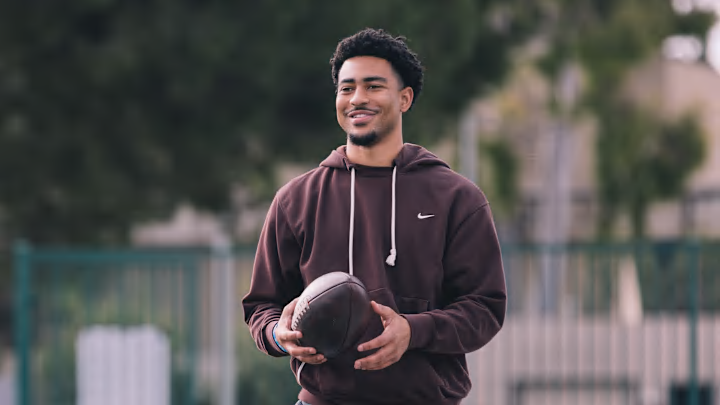How much weight does the S2 Cognition test hold amongst NFL prospect evaluations as the Carolina Panthers get set to name their No. 1 pick?
In case the rock you’ve been under doesn’t get great service, walk with me as I lay out the current landscape as it pertains to the Carolina Panthers.
The Panthers hold the golden ticket to the 2023 NFL Draft, in way of the No. 1 overall pick they acquired after trading away draft capital along with D.J. Moore. This has thrown Carolina's fanbase into absolute hysterics, attempting to decode body language, reading between covert lines, and hotly debating every intricacy attached to the initial top-four quarterback prospects of the class.
It does seem, at least at this exact moment in which I’m writing this, that the race has tightened to three most likely options: Bryce Young, C.J. Stroud, and Anthony Richardson. These three prospects couldn’t demonstrate more vastly different skill sets, physical traits, and experience levels if they legitimately tried.
Amidst the spirited growlings of fans, rumblings about a cognitive test and its correlation to the top-tier NFL quarterbacks started infiltrating tweets and posts across socials.
The S2 Cognition test. Matt Barrows published an informative in-depth article for The Athletic on the S2, but described the exam as follows:
"The exam lasts 40 to 45 minutes. It’s performed on a specially designed gaming laptop and response pad that can record reactions in two milliseconds. To put that in perspective, an eye blink lasts 100 to 150 milliseconds."Matt Barrows, The Athletic
Should the S2 Cognition Test matter to the Carolina Panthers?
Honestly, it’s difficult to really wrap my exceptionally typical mind around that reactionary intuitiveness – so much faster than a simple blink of an eye. It makes a lot of sense why this test is being used as such a valuable tool throughout sports.
We’ve all heard the coach or even the gym teacher with two different tube socks, imploring their subjects to view ‘the game’ as 90 percent mental and 10% physical. These types of measurable cognitive exams are supporting that sentiment, at the very least.
Many will be reminded of the good ol’ Wonderlic exam that was a staple in the pre-draft interviews and the NFL Scouting Combine process for incoming prospects. This is more of a general problem-solving and intelligence test, rather than any kind of processing metrics.
The Wonderlic is a 50-question multiple-choice exam that prospects are given 12 minutes to complete. The questions begin at an easier degree of difficulty, working their way up the spectrum as the test taker moves along
Carolina Panthers should take the S2 Cognitive Test into account
While helpful, I suppose, the Wonderlic was far from a predictive tool. That’s not how Brandon Ally and his partner Scott Wylie, cofounders of the S2, view their contribution to the world. In fact, as Barrows reports:
"Ally said the cognition test not only can forecast whether a quarterback will be successful in the NFL, it comes close to predicting the quarterback’s career passer rating."Matt Barrows, The Athletic
I don’t have any kind of qualifications to dispute that belief or argue the obvious direct correlation, especially against the neuroscientist that helped create the test. My biggest takeaway is that it’s clearly beneficial when used as part of the evaluation of a prospect.
After all, numbers don’t mean as much if the tape and wins don’t sync up.
How does elite processing play out on the NFL field? Former quarterback and ESPN analyst Dan Orlovsky recently provided a Layman’s Terms answer to it:
What is “processing”?
— Dan Orlovsky (@danorlovsky7) April 12, 2023
Learn it on paper—feel it in a game!!@_bryce_young has BY FAR the best feel in this class—to any spot on the field #NFLDraft pic.twitter.com/l4B1aVoFgJ
Young has been said to have scored the highest result on the S2 Cognitive Test of all quarterbacks prospects in the 2023 class. It’s also been recently reported that Jake Haener has said he scored in the 97th percentile.
Laws of deduction lead us to believe that Young scored no lower than the 98th percentile, putting him at a truly elite processing level to go along with his intangibles, evasiveness, accuracy, and off-script playmaking.
For what it’s worth, and the for the sake of being fair, Will Levis apparently scored around the 93rd percentile. Richardson and Stroud supposedly fell somewhere between 80-90. Should be noted, that’s all speculative until confirmed.
So, with so much of the conversation about Young being his slight stature and the possible physical limitations that come along with that, such as capped arm strength, field vision, and durability. – how does his reported superhuman processing ability catapult him over the bigger, stronger, faster prospects like Stroud and Richardson?
The NFL is an incredibly fast sport where every second matters. The rapport between quarterbacks and their receiving corps is so important because of the importance of timing, familiarity, and understanding of what your teammate will do before the opponent does. Not to mention grasping blocking assignments and identifying where you may be vulnerable at the snap.
If you’re concerned about Young’s arm strength getting him in trouble on opposite hash throws, his processing of a defense’s movements and alignments are his retort.
Durability? Sure, he’s a small football player. Big football players could hurt him. I’ve also seen plenty of big football players hurt other big football players. Besides that, it’s a lot more difficult to get hands-on with him if he’s a step ahead.
I don’t suggest all of this solely to push a personal affinity for Young to be the No. 1 overall pick, either. I do, however, believe there is more to the game of football than only being bigger and stronger than the next man. Especially when we’re talking about a franchise field general that the Panthers are about to hand the keys to the castle.
